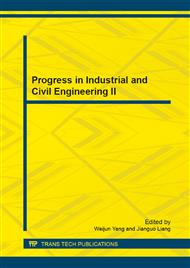p.2771
p.2778
p.2782
p.2789
p.2795
p.2801
p.2806
p.2810
p.2815
Experimental Research on Temperature-Stress of Inorganic Polymer Concrete
Abstract:
The inorganic polymer concrete is a new environmentally material. Using the temperature - stress test machine to research its early cracking sensitivity, and compare it with the normal concrete. The deformation development process of inorganic polymer concrete consists three stages:early contraction, expansion, contraction to cracking; cracking temperature can effectively evaluate the overall cracking performance of concrete; the cracking temperature of inorganic polymer concrete is 14.2 °C, the normal concrete is 14.4 °C; the inorganic polymer concretes cracking stress is 2.658MPa, the normal concrete is 0.582MPa. The results show the inorganic polymers cracking performance is better than the normal concrete.
Info:
Periodical:
Pages:
2795-2800
Citation:
Online since:
September 2013
Authors:
Price:
Сopyright:
© 2013 Trans Tech Publications Ltd. All Rights Reserved
Share:
Citation:


